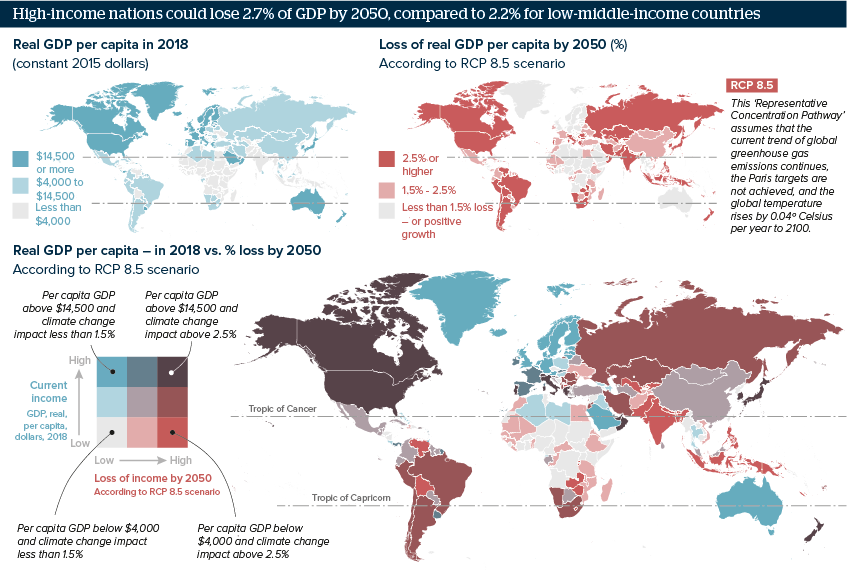Climate change GDP risk is high regardless of income
A new study overrules past suggestions that poorer, tropical nations will lose more GDP to the impacts of climate change
Source: NBER paper ‘Long-Term Macroeconomic Effects of Climate Change: A Cross-Country Analysis’, August 2019, Universities of Cambridge, Southern California, Johns Hopkins, National Tsing Hua University and the IMF; IMF World Economic Outlook ; Oxford Analytica calculations
Outlook
A report released last month, which models 174 nations from 1960-2014, suggests that the world will be 2.5% poorer by 2050 unless efforts to meet the Paris agreement surge. Campaigns to attract funding to poor nations have helped to publicise studies suggesting that these countries, especially tropical ones, are at higher risk but importantly, this research shows that colder, richer, higher carbon-emitting economies will be as badly affected.
The model examines the impact on investment and labour productivity, expanding on models which focused on temperature variation affecting supply factors including agricultural yields. However, far less GDP will be lost if this inspires countries, especially high-income ones, to invest more in meeting Paris targets.
Impacts
- Analysis of 45 nations’ climate coverage suggests that rich nations focus locally, poorer ones globally; nationalism may boost this trend.
- Reducing land degradation will provide immediate and long-term benefits to communities and support multiple sustainable development goals.
- Climate change will lift net-food-exporting regions’ terms of trade, notably the Americas and Oceania; net importers will bear the cost.
- Four of the five highest impact risks and the three likeliest in the World Economic Forum’s annual global risks report are environmental.
See also
- Climate policies to alter global business environment - Jun 23, 2023
- Climate change to hit development in the global south - Jul 29, 2021
- Pandemic response threatens climate funding shortfall - Oct 20, 2020
- Pandemic will weigh on green bond issuance this year - Aug 24, 2020
- Policies curbing climate shocks will be stagflationary - Dec 20, 2019
- Future of climate change will depend on China - Nov 15, 2019
- Cities are at the forefront of global warming threats - Oct 8, 2019
- Central Asian states face high climate change risks - Oct 4, 2019
- Climate change will prompt major reform in South Asia - Sep 11, 2019
- South-east Asia eyes local electric auto manufacturing - Sep 6, 2019
- Nations will struggle to meet net zero emissions goals - Aug 22, 2019
- More graphic analysis
